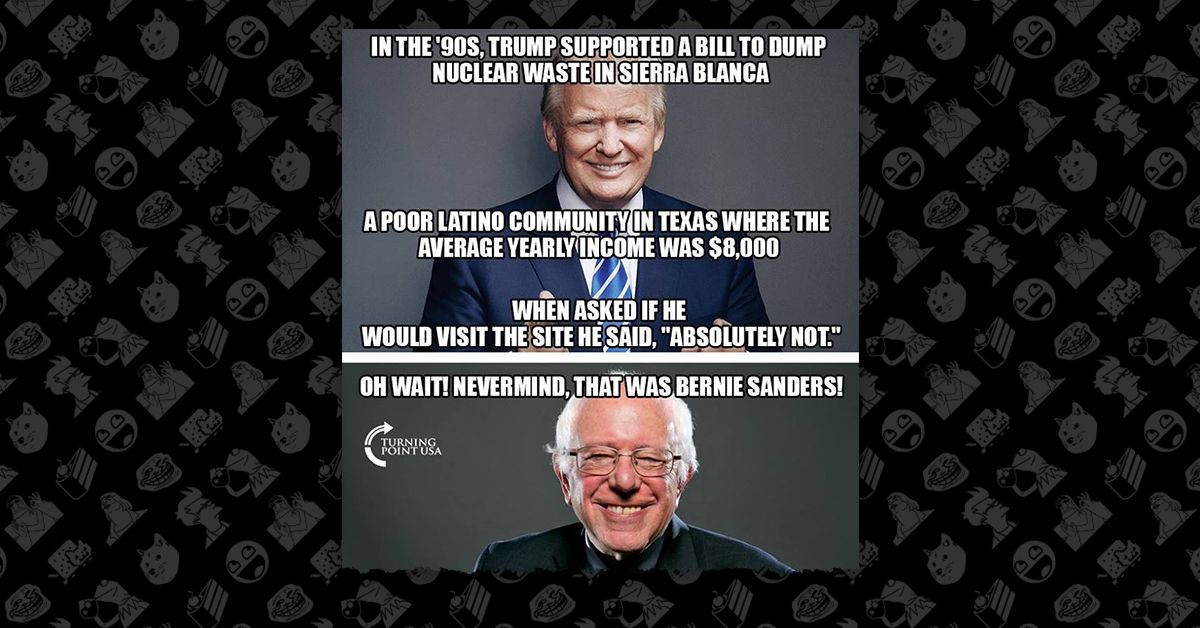Sanders did support a proposal in which Maine and Vermont could dispose of low-level nuclear waste a proposed site in Sierra Blanca, Texas, which is a predominantly Latino and relatively poor community.
It's not clear whether Sanders told activists he would "absolutely not" visit the proposed disposal site. This was corroborated by an activist who was present, but a spokesperson for Sanders did not address it in response to our queries.
In April 2018, the right-leaning Turning Point USA posted a Facebook meme which attacked Independent Vermont Senator Bernie Sanders for once supporting a proposal to "dump nuclear waste" in a "poor Latino community in Texas":
In the 90's, Trump supported a bill to dump nuclear waste in Sierra Blanca, a poor Latino community in Texas where the average yearly income was $8,000. When asked if he would visit the site, he said "Absolutely not."
Oh wait! Never mind, that was Bernie Sanders! And he actually co-sponsored the bill!
The meme was re-posted by the "Capitalism" Facebook page:
In 1997 and 1998, Sanders did indeed support a measure that gave Congressional approval to an arrangement that would have allowed the states of Maine and Vermont to transport and dispose of nuclear waste at a proposed site in the sparsely populated town of Sierra Blanca in Hudspeth County, close to the Mexican border in West Texas.
As the meme suggests, Sierra Blanca was (and is) a predominantly Latino community. U.S. Census Bureau records show that in 2000, two years after the proposal, 73 percent of the town's 533 residents identified as Hispanic or Latino, and almost all of those as Mexican. In 2016, some 69 percent of Sierra Blanca's 557 residents identified as Hispanic or Latino.
In 1999, the annual per capita income of Sierra Blanca residents was $10,768, which was 45 percent lower than that of Texans at large ($19,617). In 2016, the median household income in Sierra Blanca was estimated to be $41,875 as compared to $54,727 in the state of Texas.
As an Independent member of the U.S. House of Representatives for Vermont, Sanders was one of 23 co-sponsors of House Resolution 629, which called for Congress to give its consent to the Texas Low-Level Radioactive Waste Disposal Compact — an agreement between the states of Texas, Maine, and Vermont.
Speaking on the floor of the house in October 1997, Sanders said he was in "strong support" of the resolution for environmental reasons, and stressed that he personally was opposed to the use of nuclear power, but that the waste it produces had to be disposed of as safely as possible.
It is worth reading a relatively extensive excerpt from his remarks in order to get a good sense of Sanders' stated reasoning:
Let me touch, for a moment, upon the environmental aspects of this issue. And let me address it from the perspective of someone who is an opponent of nuclear power, opposes the construction of nuclear power plants and if he had his way, would shut down the existing nuclear power plants as quickly and as safely as we could.
One of the reasons that many of us oppose nuclear power plants is that when this technology was developed, there was not a lot of thought given as to how we dispose of the nuclear waste. But...the reality, as others have already pointed out, is that the waste is here. We can't wish it away. It exists in power plants in Maine and Vermont, it exists in hospitals, it is here...So the real environmental issue here is not to wish it away, but to make the judgement, the important environmental judgement as to what is the safest way of disposing of the nuclear waste that has been created.
...Leaving the radioactive waste at the site where it was produced -- despite the fact that that site might be extremely unsafe in terms of long-term isolation of the waste, and was never intended to be a long-term depository of low-level waste -- is horrendous environmental policy...No reputable scientist of environmentalist believes that the geology of Vermont or Maine would be a good place for this waste. In the humid climate of Vermont and Maine, it is more likely that ground water will come in contact with that waste and carry off radioactive elements to the accessible environment.
There is widespread scientific evidence to suggest, on the other hand, that locations in Texas -- some of which receive less than 12 inches of rainfall a year, a region where the groundwater table is more than 700 feet below the surface -- is a far better location for this waste. This is not a political assertion, it is a geological and environmental reality.
A video clip of his comments can be viewed here.
Congress passed the resolution comfortably by 305 votes to 117, as did the Senate, by 78 votes to 15.
The proposal had much stronger support among Republicans than among Democrats. GOP members of the House voted 197-26 in favor, while Democrats were more evenly split, voting 107-91 in favor. In the Senate, not a single Republican opposed H.R. 629, while 51 of them voted for it. Fifteen Democratic Senators opposed the bill, while 27 of them voted in support.
At that time, five out six Senators from Texas, Vermont, and Maine were Republicans. All five of them voted in favor of the proposal. Both of Maine's Representatives voted for the disposal site, as did 10 out of the 13 Republican Congress members from Texas. In the House, the proposal had 23 co-sponsors. Eleven were Republicans, eleven were Democrats, and one was Sanders himself, an Independent. The author of the resolution was Joe Barton, a Republican from Texas.
Despite Congressional approval for the agreement, authorities in Texas ultimately rejected the proposal to establish a disposal site at Sierra Blanca. In October 1998, the Texas Natural Resource Conservation Commission voted 3-0 against issuing a permit for the construction of a nuclear waste dump there. According to the Associated Press, commission chairman Barry McBee said the disposal site could have provided a much-needed economic boost to the area, but commission members were sufficiently concerned about safety issues to deny the permit.
According to a September 1998 article in the Texas Observer, a group of activists opposed to the Sierra Blanca waste site approached Sanders at an anti-nuclear weapons rally in Vermont that year:
Sanders left the stage, which surprised no one in the small Texas delegation. Earlier, he had told them, "My position is unchanged, and you're not gonna like it." When they asked if they would visit the site in Sierra Blanca, he said, "Absolutely not. I'm gonna be running for re-election in the state of Vermont."
We contacted Bill Addison, a leading opponent of the Sierra Blanca proposal, who was identified in the Texas Tribune article as having attended that Springfield rally. He confirmed that he was present and corroborated the article's account of the activists' interaction with Sanders.
We asked a spokesperson for Sanders whether he agrees that this exchange took place, but we did not receive a response to that specific question. Instead, the spokesperson offered a broader explanation and defense of the Senator's support of H.R. 629:
The only reason Senator Sanders was ever involved is because the constitution requires Congress to approve interstate compacts. Texas Representative Joe Barton introduced such legislation in 1998, and twenty-three members of the Vermont, Texas and Maine congressional delegations cosponsored it.
The bill did not endorse a specific site — in fact, it did not mention Sierra Blanca at all. Nor did the bill override the local and state approval process. In the end, the Texas agency in charge of permitting ruled against the Sierra Blanca site, choosing another site in Texas instead. So, the process worked.
The compact, much less the site selection were never Sen. Sanders’ idea. He disagrees with the very premise of the 1980 law that led to the Texas-Vermont-Maine compact, since it put the burden of disposing of low-level waste on the states, rather the nuclear energy companies that produced much of the waste.
In fact, he has long been an opponent of nuclear power precisely it produces waste for which we still have no solution (the Texas site is just for low-level contamination — there is still no plan for all of the high-level nuclear waste all across the country).
Sanders' spokesperson is right to point out that the text of H.R. 629 did not mention Sierra Blanca, but the town was widely known and discussed as the proposed location of the disposal site throughout the time that Sanders and others supported the bill. For example, in April 1998 (three months before Sanders and others in the House voted in favor of H.R. 629) the late Minnesota Senator Paul Wellstone condemned the proposed Sierra Blanca site from the floor of the Senate:
What has troubled me from the very beginning is that this legislation would result in the dumping of low-level radioactive waste in a small, poor, majority-Latino community in rural West Texas — a town called Sierra Blanca. The Texas legislation in 1991 identified the area where the dump will be located. The Texas Waste Authority designated the site near Sierra Blanca in 1992. A draft license was issued in 1996. Whether we like it or not, this knowledge makes us responsible for what happens to Sierra Blanca.
The Turning Point USA meme is accurate in claiming that Sanders supported and co-sponsored a proposal that would have seen nuclear waste from Maine, Vermont and (principally) Texas disposed of at a site in Sierra Blanca, and that Sierra Blanca was (and still is) a predominately Latino and relatively poor community. The meme leaves out important and relevant context by failing to mention the key role that Republicans played in crafting and passing that proposal; instead, it singles out Sanders and does not offer the reader any inkling of his environmentalist rationale.
Sanders stood to gain politically from supporting a plan that would remove nuclear waste from his constituency, but this does not necessarily mean he wasn't motivated by a sincere desire to dispose of the waste in a manner and location that he genuinely believed to be safer. However, whether or not you believe his stated rationale was sincere, no proper analysis of a particular politician's policy position or Congressional vote should leave out the reasons put forward by that politician.
Finally, we were not able to corroborate the "Absolutely not" quotation attributed to Sanders, and his spokesperson did not address our question about it.


